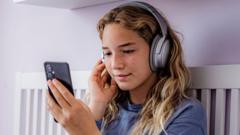
Australia Proposes Groundbreaking Social Media Ban for Children Under 16
The Australian government has introduced controversial legislation to ban children under 16 from accessing social media platforms, a move Prime Minister Anthony Albanese describes as “world-leading” in protecting young people from online harm.
The proposed ban would cover major platforms like X, TikTok, Facebook, and Instagram, with tech companies facing potential penalties of up to A$50 million for non-compliance. The legislation, which is expected to be reviewed in the Senate, aims to address growing concerns about the negative impacts of social media on children’s mental health and well-being.
The proposal stems from real-life experiences like that of James, a 12-year-old who encountered cyberbullying on Snapchat. After receiving threatening messages from older teenagers, James deleted his account, and his mother supports the proposed ban as a necessary protection for children.
However, the proposed legislation has met with significant criticism and skepticism. eSafety Commissioner Julie Inman Grant acknowledges that the evidence linking social media to declining mental health is not conclusive. Her office’s research suggests that some vulnerable groups, such as LGBTQ+ and First Nations teenagers, actually find online spaces empowering.
Experts and academics have raised several concerns about the ban:
1. Over 100 Australian academics argue it’s “too blunt an instrument” and contradicts UN advice about providing safe digital access.
2. A bipartisan parliamentary committee recommended stricter regulations for tech companies instead of an outright ban.
3. Researchers like Joanne Orlando emphasize that education about digital literacy should be the primary strategy, not just prohibition.
Practical challenges of implementing the ban are also significant. Previous international attempts to restrict youth online access have largely failed:
– South Korea’s “shutdown law” for internet games was scrapped in 2011
– France’s similar legislation was easily circumvented using VPNs
– A comparable law in Utah was blocked as unconstitutional
The Australian government acknowledges the potential limitations, with Albanese stating that while some people might find ways around the laws, it doesn’t absolve society of its responsibility to protect children.
Supporters like Amy Friedlander from the Wait Mate movement argue that the ban addresses an “impossible choice” parents face between allowing potentially harmful device use and social isolation.
The legislation includes plans for future “digital duty of care” laws and has already invested A$6 million in developing digital literacy tools. The eSafety Commissioner suggests using third-party services to anonymize age verification, though technical challenges remain.
While the ban’s effectiveness is uncertain, proponents believe its primary value is sending a strong message about protecting children’s mental health and encouraging more real-world social interactions.









